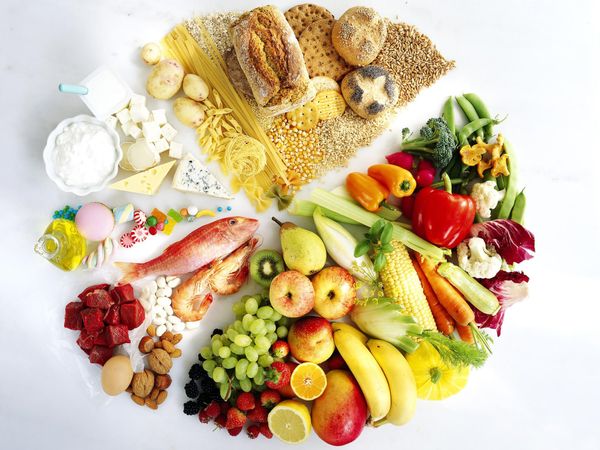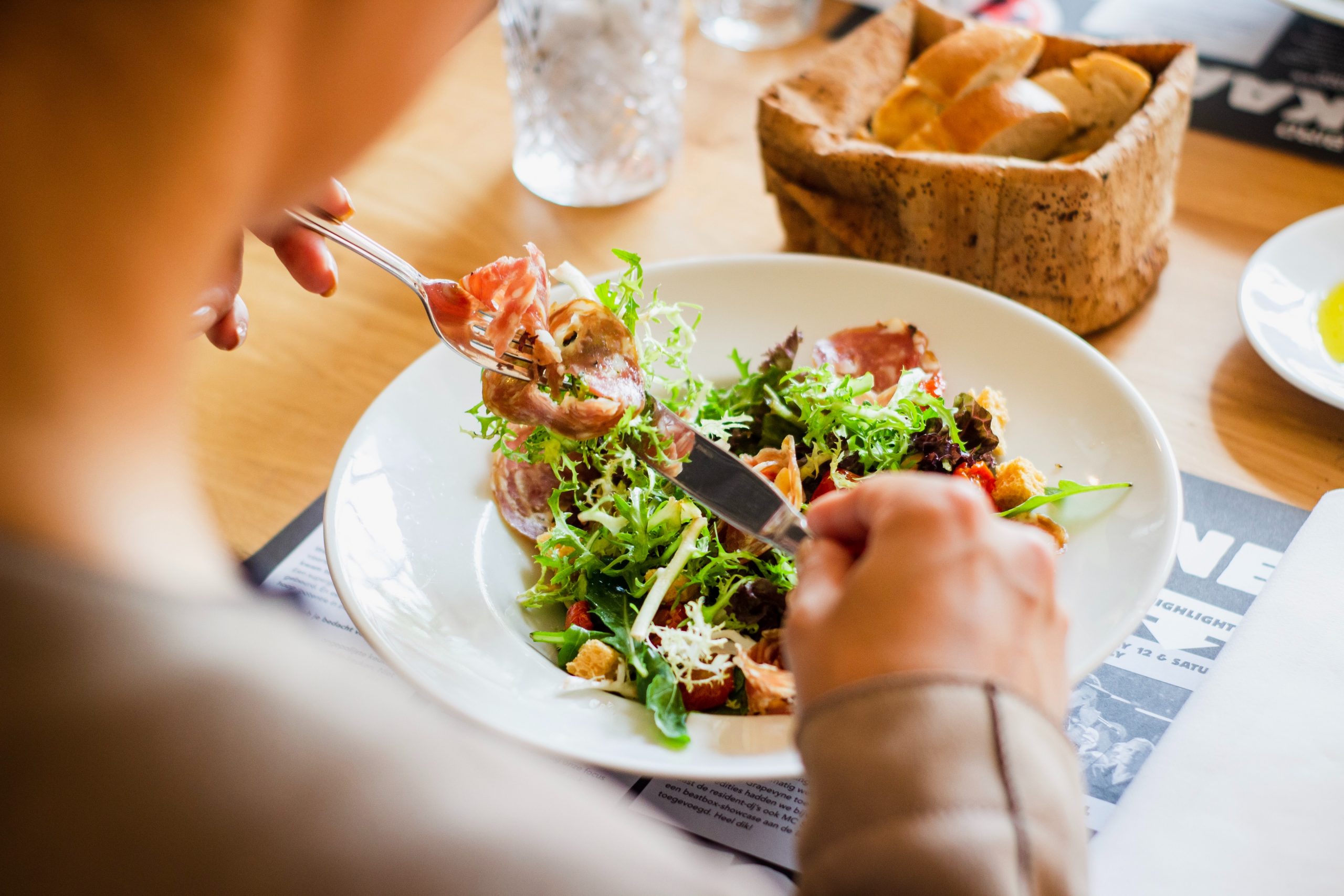Has your stomach ever felt more like a balloon than a food-digesting machine? Been there, felt that. While bloating can be impacted by GI-related conditions such as irritable bowel syndrome (IBS), what we eat is a huge piece of the puffiness pie. In the same way that there are foods that cause bloating, there are also foods to reduce bloating.
First, why do you experience bloating?
Bloating can be caused by a number of factors that lead to large amounts of air being trapped in the digestive tract,” says Rania Batayneh, MPH, owner of Essential Nutrition For You and author of The One One One Diet. Batayneh explains that there are a few reasons why you’re feeling bloated:
- what you’re eating (foods high in fiber, fat, salt, and carbonated beverages, to name a few)
- how you eat (eating too fast can cause you to take in more air)
- IBS
- having an unidentified food sensitivity
- genetics
What’s special about functional foods that reduce bloating?
So now that we know what to avoid, what should we add to our menus to help prevent or reduce bloating?
Seek out foods high in potassium and water. When you don’t eat enough potassium, your body will hold onto extra sodium and water, which can cause a distended belly.
To make potentially bloat-causing foods easier to digest, try cooked veggies instead of raw, and sprouted grains, nuts, seeds, and legumes rather than regular.
The best foods to reduce bloating
Experiencing bloating is usually tied to how you eat and what foods you eat when bloated. That means that a few simple changes can ease your discomfort and help you lose weight along the way.
We found the 15 best foods that help with bloating so you can finally find some relief.
Quinoa

Have you ever felt bloated or downright uncomfortable after eating pasta or bread? You might have an underlying gluten sensitivity. While only one in 100 people worldwide have Celiac disease—a more serious condition that causes damage to cells in the intestines when one consumes gluten—it’s estimated that six in 100 experience some adverse reactions and discomfort when eating foods with wheat.
“It’s best to consult with a medical doctor before assuming you have a gluten-intolerance,” Fine says. “If you find out that you do, gluten-free starches like quinoa can be easier to digest.” (ICYMI, here’s what dietitians want you to know about gluten-free diets.)
Cucumbers

At 95 percent water, these refreshing veggies are one of the ultimate ways to eat your way to better hydration. Since they’re super-hydrating, cucumbers “can help to flush the GI tract, increasing passage of food that may otherwise be resulting in constipation, gas, and bloat,” Fine says.
Cucumbers also offer the flavonoid quercetin, which can help reduce inflammation throughout your digestive system.
Celery

Celery—not to be confused with the celery juice trend!—is one of the best foods to reduce bloating because it’s naturally high in water.
Water-rich celery does more than just add some easy crispy texture to your salads; it also has diuretic properties and 104 milligrams of potassium in every 6-calorie crunchy stalk. And similar to cucumbers, celery’s flavonoids (including apigenin) have been proven to be anti-inflammatory, according to a study published in the journal Molecular Nutrition & Food Research.
Pineapple

Pineapple contains an enzyme called bromelain, which breaks down protein and aids digestion.
Low in sodium and loaded with 180 milligrams of potassium per cup, this sweet and juicy fruit has also been proven to reduce bloating. According to research in the journal Clinical Immunology, pineapple can reduce colonic inflammation that may be leading to that distended stomach.
Yogurt

We’re not talking about the sweet, sugary froyo you snag at those multi-handle shops.
Kefir

If you don’t do dairy, consider yogurt’s cousin, kefir. This tangy fermented drink contains lactase, an enzyme that breaks down lactose—aka the main sugar in milk that may give you tummy trouble. A study in the Journal of the American Academy of Nutrition and Dietetics found that drinking kefir reduced lactose digestion symptoms including bloating, stomach pain, and gas by up to 70 percent.
Asparagus

With 271 milligrams of potassium per cup, this is one veggie definitely worth stocking up on one of the best foods to reduce bloating. But its belly benefits don’t stop there.
“Asparagus contains asparagine, an amino acid that acts as a diuretic. It’s also rich in prebiotics, the food that good bacteria [probiotics] in your gut feed on, which leads to better gut health,” Batayneh says.
Bananas

Well known as one of the most potassium-rich foods on the planet, with 422 milligrams per medium fruit, banana’s bloat-reducing appeal doesn’t stop there.
Compared to drinking a banana-flavored juice or water before a meal, eating a pre-meal banana reduced bloating by a significant amount for healthy female participants in a study published in the journal Anaerobe. The scientists attribute these belly-calming results to the prebiotics in the fruit.
Tomatoes

Whether you get your dose in marinara sauce or soup, add tomatoes to your diet to reduce bloating. Tomatoes contain high levels of lycopene. That antioxidant has been shown to have a wide variety of anti-inflammatory and de-bloating effects, per a review in the journal Annual Review of Food Science and Technology. Pro tip: Cook them to unlock way more lycopene than raw, though.
And as a bonus, these ruby red fruits are potassium superstars, Fine adds (at 292 milligrams per medium tomato).
Watermelon

Grab a slice or two. Thanks to watermelon’s high water content, noshing on it can help minimize water retention. Combined with the 170 milligrams of potassium you’ll score in every cup of watermelon, you’ll have your usual stomach back in no time.
“Watermelon may help flush out excess sodium from your body, which reduces bloating,” Batayneh says.
Green Tea

The benefits of tea time go beyond inspiring you to take a break from work. Green tea is a stellar source of antioxidants and it also offers some diuretic benefits. Research published in the journal PLOS One revealed that green tea can reduce inflammation in your digestive tract by keeping your gut health in fine form.
Avocados

Guac on. All of the healthy fats in avocado may prevent uncomfortable bloating. Like the bananas and other fruits on this list, the potassium in avocados (368 milligrams per ¼ avocado) can also “help your body flush out sodium, and with it, excess water,” Batayneh says.
Turmeric

We have good news for all the golden milk devotees.”Many herbs and spices, including turmeric, have anti-inflammatory capacities and tend to relax an upset stomach,” says Batayneh.
That’s because turmeric is mostly curcumin, which has been shown to tame inflammation and calm many IBS symptoms, according to research published in the Journal of Alternative and Complementary Medicine.
Mint

There’s a good reason why your mom or grandma may have told you to turn to peppermint tea when you need to settle an upset stomach.
“In tea form or freshly chopped and sprinkled over meals, mint has antispasmodic properties, which calms the digestive tract and can reduce the pain of bloating. Mint also contains specific flavonoids that inhibit the activity of certain immune system cells that may contribute to bloating,” Batayneh says.
Ginger

Along similar lines, have you heard the rumor that ginger ale can ease stomach aches? While in processed form (in sodas, candies, and the like), ginger loses most for its health-promoting qualities, the spicy root grated or minced from raw can actually deliver on that promise. (P.S. Brewing that root into tea works too.)
“Certain compounds in ginger, including gingerol, help the stomach release gas, which cuts down on bloating,” Batayneh says. “Ginger soothes for an upset stomach, which can help relieve the discomfort of bloating.”
Source : Eat This







Leave A Comment
You must be logged in to post a comment.